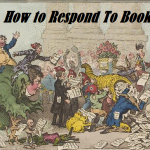
Engaging With Your Readers: Should Authors Respond to Readers’ Reviews? (Part 2) #writers #writing #selfpublish
 Engaging With Your Readers: Should Authors Respond to Readers’ Reviews? (Part 2)
Engaging With Your Readers: Should Authors Respond to Readers’ Reviews? (Part 2)
By Eve Wilson
Continued from Part 1
Is Internet Drama Distracting You From Your Writing?
Given that some readers feel intimidated when writers respond to their reviews, even if your response is not, from your point of view, an abrasive or unfriendly one, it may be prudent to stay away from posting replies to reviews as a general rule. In the case of negative reviews, it is probably wiser to retain the higher ground and keep an air of mystery about you than to get a reputation as someone who engages in online drama or who rises to provocation, real or imagined. If you give negative reviews too much power you risk becoming so disheartened that you give up on your work and join the ranks of those whom Goodereader.com describes as “authors who have declared that they will no longer write and publish their works due to the behaviors of a handful of people”. If you are planning on writing a follow up to your current book, you may want to ask yourself whether you don’t have enough to do without becoming embroiled in online drama. Writers often find themselves side-tracked by tasks that would be better left to someone else, such as that valuable second pair of eyes in the form of an editing service or a graphic artist to design the book covers. Ignoring the negative reviews, just like engaging people to help you market your book, such as a cover designer or as Wait.co.uk suggests, a content writer “whether it’s for your blog, or you need a specialist web content writer to create several hundred pages of copy for a new website that you’re launching” , allows you to prioritize your next book, instead of becoming bogged down with distractions. If you do want to discuss your writing with readers, there are platforms where this is more likely to be welcomed, for example on your blog or on Twitter. On these platforms again, whether you see your writing as a source of income or simply a hobby, it is wise to retain a professional attitude online, which includes appreciating that not everyone will love your book or care about the work that you have put into it.
Knowing Yourself and Maintaining Your Reputation
Ultimately before deciding whether or not to respond to reviews or otherwise engage with readers, you need a little insight into yourself and your reasons for writing your book. If you want to discuss your book with readers and are able to do so in a patient and rational way, it could add an extra dimension to your work. Even some well-known writers have engaged in angry exchanges with critical reviewers and, while it may not have damaged their sales to their existing fan base, projecting a hostile online persona may have done little to attract new readers. If you are interested in selling your book and building your name as a professional writer, it may be sensible to steer clear of debating with your readers if you think you will have difficulty keeping your temper or if you think the reviewer is the kind of person who is likely to try to engineer some kind of drama at your expense. In those instances, a dignified silence may be the best response.